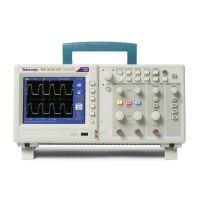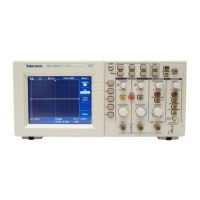USB Flash Drive and Device Ports
The oscillosco
pe creates a new folder on the flash drive and saves the screen
image, waveform data, and setup data in s eparate files in that new folder,
using the current oscilloscope and file format settings. The oscilloscope
names the folder ALLnnnn. (See page 91, Save/Recall.)
To see a list of the files created by the Saves All To Files function, access the
Utility ►File Utilities menu.
Source File name
CH(x) FnnnnCHx.CSV, where nnnn is an automatically-generated
number, and x is the channel number
MATH
FnnnnMTH.CSV
Ref(x) FnnnnRFx.CSV, where x is the reference memory letter
Screen Image FnnnnTEK.???, where ??? is the current file form at
Settings FnnnnTEK.SET
File type Contents and uses
.CSV Contains ASCII text strings that list the time (relative to the
trigger) and amplitude values for each of the 2500 waveform
data points; you can import .CSV files into many spreadsheet
and math analysis applications.
.SET Contains an ASCII text string listing of the oscilloscope
settings; refer to the TDS2000C and TPS2000 Series Digital
Oscilloscopes Programmer Manual to decode strings.
Screen images Import files into spreadsheet and word processing applications;
type of image file depends on the application.
NOTE. The oscilloscope stores these settings until you change them, even if you
push the Default Setup button.
Saves Image to File
This option lets you save the oscilloscope screen image to a file named
TEKnnnn.???, where the .??? is the current Saves Image to File format. The
next table lists the file formats.
File fo rmat Extension Comments
BMP BMP
This bitmap format uses a lossless algorithm,
and is compatible with most word processing
and spreadsheet programs;
this is the
default.
EPSIMAGE EPS Postscript format
JPEG JPG T his bitmap format uses a lossy compression
algorithm, and is commonly used by digital
cameras and by other digi
tal photographic
applications.
PCX PCX DOS Paintbrush format
68 TDS2000C and TDS1000C-EDU Series Oscilloscope User Manual

